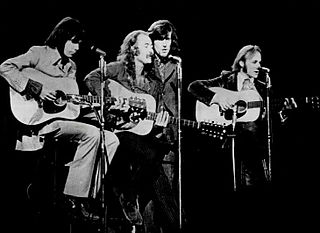
Crosby, Stills & Nash (CSN) was a folk-rock supergroup made up of the American singer-songwriters David Crosby and Stephen Stills and the English singer-songwriter Graham Nash. When joined by the Canadian singer-songwriter Neil Young as a fourth member, they were called Crosby, Stills, Nash & Young (CSNY). They are noted for their intricate vocal harmonies and lasting influence on American music and culture, as well as their political activism and often tumultuous interpersonal relationships.

Stephen Arthur Stills is an American musician, singer, and songwriter best known for his work with Buffalo Springfield, Crosby, Stills & Nash, and Manassas. As both a solo act and member of three successful bands, Stills has combined record sales of over 35 million albums. He was ranked number 28 in Rolling Stone's 2003 list of "The 100 Greatest Guitarists of All Time" and number 47 in the 2011 list. Stills became the first person to be inducted twice on the same night into the Rock and Roll Hall of Fame. According to Neil Young, "Stephen is a genius".
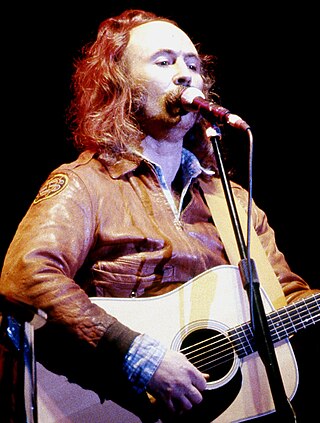
David Van Cortlandt Crosby was an American singer, songwriter, and guitarist. He first found fame as a member of the Byrds, with whom he helped pioneer the genres of folk rock and psychedelia in the mid-1960s, and later as part of the supergroup Crosby, Stills & Nash, who helped popularize the California sound of the 1970s. In addition to his music, Crosby was known for his outspoken personality, politics, and personal troubles; he was sometimes depicted as emblematic of the counterculture of the 1960s.

Graham William Nash is an English-American musician, singer and songwriter. He is known for his light tenor voice and for his contributions as a member of the Hollies and Crosby, Stills & Nash.

The Hollies are an English rock and pop band formed in 1962. One of the leading British groups of the 1960s and into the mid-1970s, they are known for their distinctive three-part vocal harmony style. Allan Clarke and Graham Nash founded the band as a Merseybeat-type group in Manchester, although some of the band members came from towns further north, in east Lancashire. Nash left the group in 1968 to form Crosby, Stills & Nash, though he has reunited with the Hollies on occasion.

Crosby, Stills & Nash is the debut studio album by the folk rock supergroup Crosby, Stills & Nash (CSN), released in 1969 by Atlantic Records. It is the only release by the band prior to adding Neil Young to their lineup. The album spawned two Top 40 singles, "Marrakesh Express" and "Suite: Judy Blue Eyes", which peaked respectively at No. 28 during the week of August 23, 1969, and at No. 21 during the week of December 6, 1969, on the US Billboard Hot 100. The album itself peaked at No. 6 on the US Billboard Top Pop Albums chart. It has been certified four times platinum by the RIAA for sales of 4,000,000.

"If I Needed Someone" is a song by the English rock band the Beatles, written by George Harrison, the group's lead guitarist. It was released in December 1965 on their album Rubber Soul, except in North America, where it appeared on the June 1966 release Yesterday and Today. The song reflects the reciprocal influences shared between the Beatles and American band the Byrds. On release, it was widely considered to be Harrison's best song to date. A recording by the Hollies was issued in Britain on the same day as Rubber Soul and peaked at number 20 on the national singles chart.

Harold Allan Clarke is an English rock singer, who was one of the founding members and the original lead singer of the Hollies. He achieved international hit singles with the group and is credited as co-writer on several of their best-known songs, including "On a Carousel", "Carrie Anne", "Jennifer Eccles" and "Long Cool Woman in a Black Dress". He retired from performing in 1999, but returned to the music industry in 2019. Clarke was inducted into the Rock and Roll Hall of Fame in 2010.

If I Could Only Remember My Name is the debut solo album by American singer-songwriter David Crosby, released on February 22, 1971, by Atlantic Records. It was one of four high-profile albums released by each member of Crosby, Stills, Nash & Young in the wake of their chart-topping 1970 album Déjà Vu. Guests on the album include Jerry Garcia, Graham Nash, Neil Young, Joni Mitchell, and other prominent West Coast musicians of the era.

Stephen Stills is the debut solo album by American musician Stephen Stills released on Atlantic Records in 1970. It is one of four high-profile albums released by each member of Crosby, Stills, Nash & Young in the wake of their 1970 chart-topping album Déjà Vu, along with After the Gold Rush, If I Could Only Remember My Name and Songs for Beginners. It was primarily recorded between CSNY tours in London and Los Angeles. It was released in the United States on November 16, 1970, and in the United Kingdom on November 27, 1970.
"Wasted on the Way" is a 1982 song by American folk rock band Crosby, Stills & Nash, featuring harmony vocals by Timothy B. Schmit. It was their first top 10 hit in five years, and peaked at #9 on the Billboard Hot 100 singles charts in August 1982. On the Adult Contemporary chart, "Wasted on the Way" was the group's biggest hit on the chart, peaking at number two for five weeks. It appeared on the band's 1982 album Daylight Again. The B-side was the David Crosby composition "Delta".

"Teach Your Children" is a song written by Graham Nash in 1968 when he was a member of the Hollies. Although it was never recorded by that group in a studio, the Hollies did record it live in 1983. After the song was initially recorded for the album Crosby, Stills & Nash in 1969, a much more enhanced version of the song was recorded for the album Déjà Vu by Crosby, Stills, Nash & Young, released in 1970. As a single, the song peaked at No. 16 on the Billboard Hot 100 charts that year. On the Easy Listening chart, it peaked at No. 28. In Canada, "Teach Your Children" reached No. 8. Reviewing the song, Cash Box commented on the "incredible soft harmony luster" and "delicately composed material." Billboard called it "a smooth country-flavored ballad that should prove an even bigger hit on the charts [than 'Woodstock']." Stephen Stills gave the song its "country swing", replacing the "Henry VIII" style of Nash's original demo.
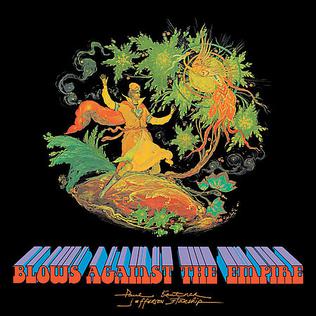
Blows Against the Empire is a concept album by Paul Kantner, released in 1970 under the name Paul Kantner and Jefferson Starship. It is the first album to use the "Starship" moniker, a name which Kantner and Grace Slick would later use for the band Jefferson Starship that emerged after Jack Casady and Jorma Kaukonen left Jefferson Airplane. From a commercial standpoint, it performed comparably to Jefferson Airplane albums of the era, peaking at No. 20 on the Billboard 200 and receiving a RIAA gold certification. It was one of the first two albums to be nominated for a Hugo Award in the category of Best Dramatic Presentation.
"Guinnevere" is a song written by David Crosby in 1968. The song appears on Crosby, Stills & Nash's critically acclaimed eponymous debut album. The song is notable for its serene yet pointed melody and its unique lyrics, which compare Queen Guinevere to the object of the singer's affection, referred to as "m'lady".

Hollies Sing Dylan is a 1969 cover album featuring songs written by Bob Dylan and performed by the Hollies. It is their eighth UK album. It was also released in the US as Words and Music by Bob Dylan with a different cover but using the same band image and track order. First released on compact disc in West Germany in the late 1980s, it was not released in that format in the rest of Europe until 1993. For this issue, two bonus tracks, the single version of "Blowin' in the Wind" and a live version of "The Times They Are a-Changin'". A later remastered issue in 1999 added a third bonus track, a live version of "Blowin' in the Wind".
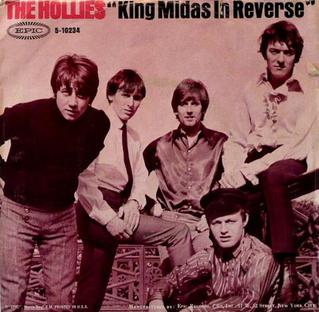
"King Midas in Reverse" is a song by English pop group the Hollies, written by Graham Nash but credited to Allan Clarke, Nash and Tony Hicks. It was released as a single in September 1967 in anticipation of the band's album Butterfly.
"Helplessly Hoping" is a 1969 song by the American folk rock group Crosby, Stills, and Nash written by Stephen Stills, and using both alliteration and wordplay in its lyrics. They recorded the song at Wally Heider's Studio 3, Hollywood in December 1968 during their first recording session as a group, with producer Paul Rothchild. The song was first released by Atlantic Records on Crosby, Stills, and Nash's eponymous debut album on May 29, 1969. In June 1969, they released it as the B-side of their debut single "Marrakesh Express".
"Country Girl" is a song written by Neil Young that was first released on Crosby, Stills, Nash & Young's 1970 album Déjà Vu.
"4 + 20" is a song by Crosby, Stills, Nash & Young, written by Stephen Stills, originally released on the band's 1970 album Déjà Vu. It was performed by Stephen Stills on solo acoustic guitar.
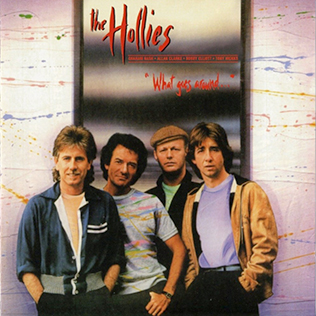
What Goes Around... is the 21st studio album by English rock/pop group, the Hollies. It includes their version of The Supremes' "Stop! In the Name of Love", which became their last US hit single. The Hollies reunited with Graham Nash for this album and for the following US tour. The LP was the band's first and last album with Nash since Butterfly (1967) and also their last one with lead singer Allan Clarke. Among the guest musicians, you can find Brian Chatton who was formerly keyboardist for The Warriors with Jon Anderson, and Flaming Youth with Phil Collins.













